ALARA members hail from all over Australia, and we also have our sponsored DX members scattered around the world.
Our members vary in age from schoolgirls to retirees; we have various backgrounds and careers, along with our families and other hobbies and interests.
You can read about some of our members on these pages and learn a little about their background to discuss next time you meet them on air!
Catherine VK7GH
Catherine is a real DXer! She recently moved from VK4 to VK7, via Malaysia! and is now busy setting up her new ham shack in northern Tasmania.
What kinds of things do you currently do with ham radio?
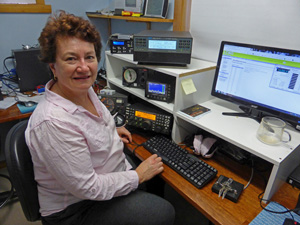 This year we have re-set up our radio shack since moving from VK4 to VK7. We have put up 2 towers, a vertical,
a couple of beverages and a dipole. I also decided to change my electronic logging program, so this involved learning the
new program, and importing my old logs buried in the back up files, as we had a 3 year gap between shacks.
I am entering contests, as usual, and also learning CW, and have just made my first CW contact in a contest, the ALARA
Contest. We now have a 5th wheeler van, so when we are on our trips around Tasmania or longer ones to the mainland in winter,
we can easily set up our portable operations. People are always interested in where you are transmitting from and your setup.
This year we have re-set up our radio shack since moving from VK4 to VK7. We have put up 2 towers, a vertical,
a couple of beverages and a dipole. I also decided to change my electronic logging program, so this involved learning the
new program, and importing my old logs buried in the back up files, as we had a 3 year gap between shacks.
I am entering contests, as usual, and also learning CW, and have just made my first CW contact in a contest, the ALARA
Contest. We now have a 5th wheeler van, so when we are on our trips around Tasmania or longer ones to the mainland in winter,
we can easily set up our portable operations. People are always interested in where you are transmitting from and your setup.
What are your favourite non-radio activities?
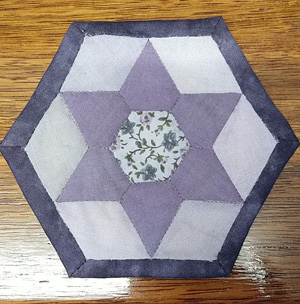 Since we have settled in VK7, we decided to get ourselves a dog, so she encourages us to take her on walks to new and
interesting places. We enrolled Amber at puppy school at the local dog club, and who should we meet but other Amateurs,
John VK7XX and Norm VK7AC. We are now part of the regular weekly Amateur coffee mornings, which also includes everyones dogs.
I have always enjoyed sewing, and did all the canvaswork, upholstery and various customised items for our boats over the
years. Now we are in a cooler climate, I am able to indulge in some knitting, making beanies for the family.
Also now I have some more spare time, I can start to re-learn other crafts like patchwork and cross stitch.
Since we have settled in VK7, we decided to get ourselves a dog, so she encourages us to take her on walks to new and
interesting places. We enrolled Amber at puppy school at the local dog club, and who should we meet but other Amateurs,
John VK7XX and Norm VK7AC. We are now part of the regular weekly Amateur coffee mornings, which also includes everyones dogs.
I have always enjoyed sewing, and did all the canvaswork, upholstery and various customised items for our boats over the
years. Now we are in a cooler climate, I am able to indulge in some knitting, making beanies for the family.
Also now I have some more spare time, I can start to re-learn other crafts like patchwork and cross stitch.
How did you get involved in ham radio and get your licence ?
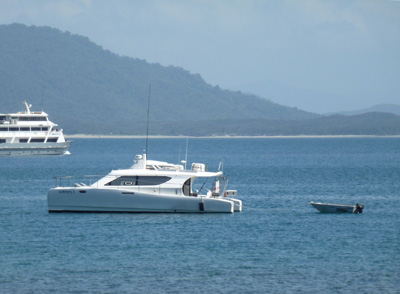 My OM and I have lived aboard boats and catamarans, that he has built, at various times in our lives. Before settling into
our home in VK4 while our boys went to high school and uni, we spent their primary school years on our catamaran Catchcry.
One year we sailed to New Caledonia and Vanuatu. At that time the HF radio was our only source of weather forecasts and
safety, and then, there were manned coast stations that we could check in to daily. Our radio receive and transmit quality
was always a source of frustration to the OM, as he did not know enough to improve it. In 2006 he hurt his shoulder, and
had to rest it, and so he decided to keep himself busy and study for his Amateur Licence and set up a radio shack in the
office, adjacent to our living room. He had just found out that CW was no longer required, always a deterrent for him
previously. He quickly progressed through the Foundation, Standard and Advanced licences using the Radio and Electronics
School program. He soon had a second hand radio and antenna, and started using them. I asked far too many questions, and
finally he encouraged me to study for my Foundation Licence also, and then the Standard Licence. About 2 years later I
studied for my Advanced Licence.
My OM and I have lived aboard boats and catamarans, that he has built, at various times in our lives. Before settling into
our home in VK4 while our boys went to high school and uni, we spent their primary school years on our catamaran Catchcry.
One year we sailed to New Caledonia and Vanuatu. At that time the HF radio was our only source of weather forecasts and
safety, and then, there were manned coast stations that we could check in to daily. Our radio receive and transmit quality
was always a source of frustration to the OM, as he did not know enough to improve it. In 2006 he hurt his shoulder, and
had to rest it, and so he decided to keep himself busy and study for his Amateur Licence and set up a radio shack in the
office, adjacent to our living room. He had just found out that CW was no longer required, always a deterrent for him
previously. He quickly progressed through the Foundation, Standard and Advanced licences using the Radio and Electronics
School program. He soon had a second hand radio and antenna, and started using them. I asked far too many questions, and
finally he encouraged me to study for my Foundation Licence also, and then the Standard Licence. About 2 years later I
studied for my Advanced Licence.
What was it like taking part in the hf maritime nets on your boat?
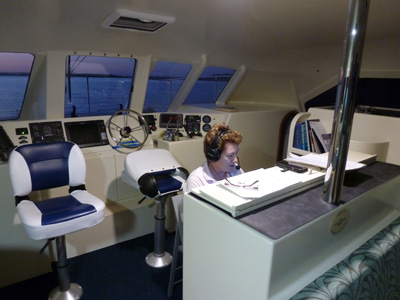 We joined the marine HF radio and participated most days, and one day a week I was net controller. Marine nets are a little
different than amateur ones, and most of the operators are the ladies on the boat and a lot more casual. The net controller
starts with emergency and priority traffic, then calls for boats under way, then boats at anchor. Each boat calls in just
the once, and if they want to contact another boat, a note is made and they talk after the net. Finally there is an
information section at the end where information regarding anchorages or items of interest are exchanged. No calls signs
are used, only boat names. In Indonesia we had a lot of trouble getting a frequency that most people could hear on most days.
We also found that only the operators that were also hams with some experience had any idea about radios and propagation.
Several times we did trials of different frequencies on different bands, but eventually settled on an 8meg frequency,
although this was plagued with Asian broadcasting at times, and we would have to change to our back up one. Between the
boats in the group we had a chat VHF channel to use between the boats, so that we did not have to use the emergency channel.
We joined the marine HF radio and participated most days, and one day a week I was net controller. Marine nets are a little
different than amateur ones, and most of the operators are the ladies on the boat and a lot more casual. The net controller
starts with emergency and priority traffic, then calls for boats under way, then boats at anchor. Each boat calls in just
the once, and if they want to contact another boat, a note is made and they talk after the net. Finally there is an
information section at the end where information regarding anchorages or items of interest are exchanged. No calls signs
are used, only boat names. In Indonesia we had a lot of trouble getting a frequency that most people could hear on most days.
We also found that only the operators that were also hams with some experience had any idea about radios and propagation.
Several times we did trials of different frequencies on different bands, but eventually settled on an 8meg frequency,
although this was plagued with Asian broadcasting at times, and we would have to change to our back up one. Between the
boats in the group we had a chat VHF channel to use between the boats, so that we did not have to use the emergency channel.
What aspects of ham radio do you enjoy the most?
My main interest now is contesting, and I like to enter the HF contests for VK and ZL. The large international contests with world wide participation are also a good chance to log a rare DX entity or island. The most enjoyable world wide contest is the Oceania DX contest, in which Amateurs from around the world point their beams towards Oceania. When there is a DXpedition to a rare entity, I make sure I know the dates and frequencies of their operation, so that I can attempt to get them in my log, I am usually successful, eventually. Watching the number of DX entities in my log grow has been very satisfying. I have worked about 250 countries, and all 40 CQ Zones. I also find the challenge of logging, and the computer interaction with the radio to be enjoyable, as I have always enjoyed using a computer my whole adult life. We have also done some portable operations for contests, and also just while away travelling in our van. If you are portable on an Island, there is always the opportunity for a 'pile up' for your contact.
What unique opportunities has ham radio given you?
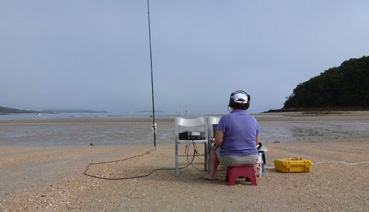 We were invited to join a DXpedition to Lord Howe Island. Many hours are spent planning the equipment and logistics for
these dxpeditions, and once you are on air, there are contacts to be made 24/7, usually with big pile ups. I was definitely
thrown in the deep end, but I learnt a lot about operating, and we got to visit the beautiful Lord Howe. A few years later
we also went to Norfolk Island for a dxpedition.
We were invited to join a DXpedition to Lord Howe Island. Many hours are spent planning the equipment and logistics for
these dxpeditions, and once you are on air, there are contacts to be made 24/7, usually with big pile ups. I was definitely
thrown in the deep end, but I learnt a lot about operating, and we got to visit the beautiful Lord Howe. A few years later
we also went to Norfolk Island for a dxpedition.
What is your role in ALARA and how has being a member been a benefit?
I am now the Treasurer of ALARA, as I was for a few years previously, but had a break when we were living and travelling on our last boat. There is an opportunity every three years to attend an ALARAmeet held in various parts of the country. We then meet face to face the ladies we talk to on air, and have our hobby in common. Lyn VK4SWE has been helping myself and a few others, by encouraging us to learn and practice our CW on air, and with our first contest contacts.
